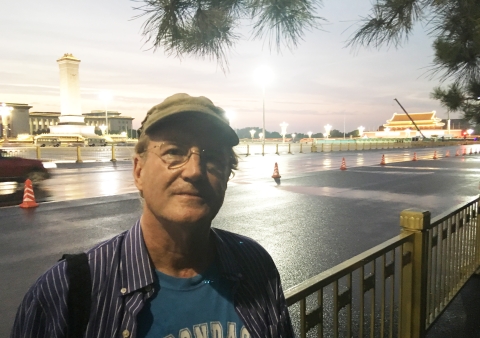Philip J. Cunningham is one of the first recipients of the inaugural ICFJ Alumni Reporting Grants. Learn about other grantees Verah Okeyo, Josh Landis and Ruth Olurounbi and Kelechukwu Iruoma.

Philip J. Cunningham received a grant for immersive storytelling from Microsoft News and the International Center for Journalists (ICFJ), but really, his whole life has been an immersive story.
“I haven’t had a straight-line career,” the veteran journalist and former ICFJ Knight International Journalism Fellow says. “There have been a lot of zig zags.”
After studying abroad in Thailand, then learning Mandarin Chinese, China became a focus of his interest. He worked as a tour guide in China and as director of a Yangtze River cruise on the luxury yacht once owned by former Communist Chairman Mao Zedong. He also worked on two critically acclaimed films, “The Last Emperor,” and “Empire of the Sun." Both movies were partially filmed in China, with Cunningham helping to translate for actors. He was a freelance journalist covering China for BBC, ABC and Japan’s NHK and other broadcast organizations, plus writing about China for The New York Times, the Los Angeles Times and the South China Morning Post, among other publications, work he continues to do as a freelancer, in addition to writing a blog.
“It’s the biggest country in the world, a great rival and alternate to the U.S.,” he says. “I was fascinated with China from the start, and I’ve been following it ever since.”
That includes making it the subject of his grant project, in which he provides a perspective 30 years after Tiananmen Square in words, photos and video. As part of the grant, Cunningham was trained in livestreaming and analyzing videos using Microsoft Video Indexer, which helps to automatically extract metadata, such as spoken words, written text, faces and scenes, from video and audio files.
“I’m thankful and appreciate the fact I had the support to re-enter an environment in which I spent a lot of time, experienced some emotionally high-valence events, and go back and listen to the echoes and look for little signs and remembrances, and try to make sense of it,” he says. “That was very gratifying to me.”
Cunningham was a graduate student and freelance journalist in China in 1989 and covered the violent military actions against student protesters in Tiananmen Square, one of the largest city squares in the world, spanning 109 acres.
Among those he interviewed was student leader Chai Ling. It was an experience of clandestine intrigue as Chai dodged and hid from authorities, speaking to Cunningham via a long car ride, then making a videotape in the apartment of some of his friends.
“One of the edifying things about most of my time in China in the 1980s was the opening up. There were a lot of problems dealing with officials, but there was always a solution,” he says. “You could talk and cajole your way out of trouble. What happened in 1989 was of a very different magnitude. There was no talking your way out of it; everything broke down, basically.”
After Tiananmen Square, Cunningham left China for Hong Kong, then Japan after that, although he continued to write about China for news organizations. “I stayed away from China for a few years,” he says. “I was really angry about what happened and in no rush to go back.”
But in time, about five years, he did start going back. The pull was strong to places and people that meant so much to him.
For the grant, and for the 30-year retrospective, Cunningham returned to Tiananmen Square last summer to pay homage – something he did with his 2009 book, "Tiananmen Moon: Inside the Chinese Student Uprising of 1989" for the 20th anniversary.
“Tiananmen Square is a place where good things happen, inspiring things happen and sometimes terrible things happen,” he says. “But it is a place that has retained, despite everything that’s happened, a kind of power, both for the government and for its critics. It’s kind of the Hyde Park of China, the central square, the village green where people, when they can, try to map out a future for their country. It still has that power. It’s a very powerful space.”
On his last visit, he says, the square seemed relatively empty, with just a few hundred people there, and quiet, a contrast from 30 years before.
“You can’t gather at Tiananmen Square and take a stand for this and that, calling out for change, courageous and patriotic things like the kids did 30 years ago,” he says. “But you can hear the echoes of it if you listen closely enough.”
This article first appeared on Microsoft Stories here. Suzanne Choney is a writer with Microsoft Stories.